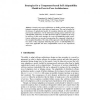Free Online Productivity Tools
i2Speak
i2Symbol
i2OCR
iTex2Img
iWeb2Print
iWeb2Shot
i2Type
iPdf2Split
iPdf2Merge
i2Bopomofo
i2Arabic
i2Style
i2Image
i2PDF
iLatex2Rtf
Sci2ools
100
click to vote
CBSE
2004
Springer
2004
Springer
Strategies for a Component-Based Self-adaptability Model in Peer-to-Peer Architectures
Abstract. Current peer-to-peer architectures are hardly resistant against unanticipated exceptions such as the failure of single peers. This can be justified by the absence of sophisticated models for exception detection and resolution in peer-to-peer architectures. On the other hand, existing generic models for such self-adaptable architectures are rather theoretical and less suitable for the usage by end-users. In this work, strategies for a new self-adaptability model in peerto-peer architecture are presented incorporating the component technology as the conceptual foundation. The claim of this approach is that through the intuitive nature of the component technology the process of self-adaptability becomes more applicable and more comprehendible even for less experienced end-users.
CBSE 2004 | Component Technology | Current Peer-to-peer Architectures | Peer-to-peer Architectures |
Related Content
| Added | 01 Jul 2010 |
| Updated | 01 Jul 2010 |
| Type | Conference |
| Year | 2004 |
| Where | CBSE |
| Authors | Sascha Alda, Armin B. Cremers |
Comments (0)

